- Browse
- Econometrics
Econometrics Courses
Econometrics courses can help you learn regression analysis, hypothesis testing, time series analysis, and causal inference. You can build skills in interpreting economic data, evaluating policy impacts, and forecasting trends. Many courses introduce tools like R, Stata, and Python, that support analyzing datasets and implementing econometric models. You'll also explore key topics such as panel data analysis, instrumental variables, and the application of statistical methods to real-world economic issues.
Popular Econometrics Courses and Certifications
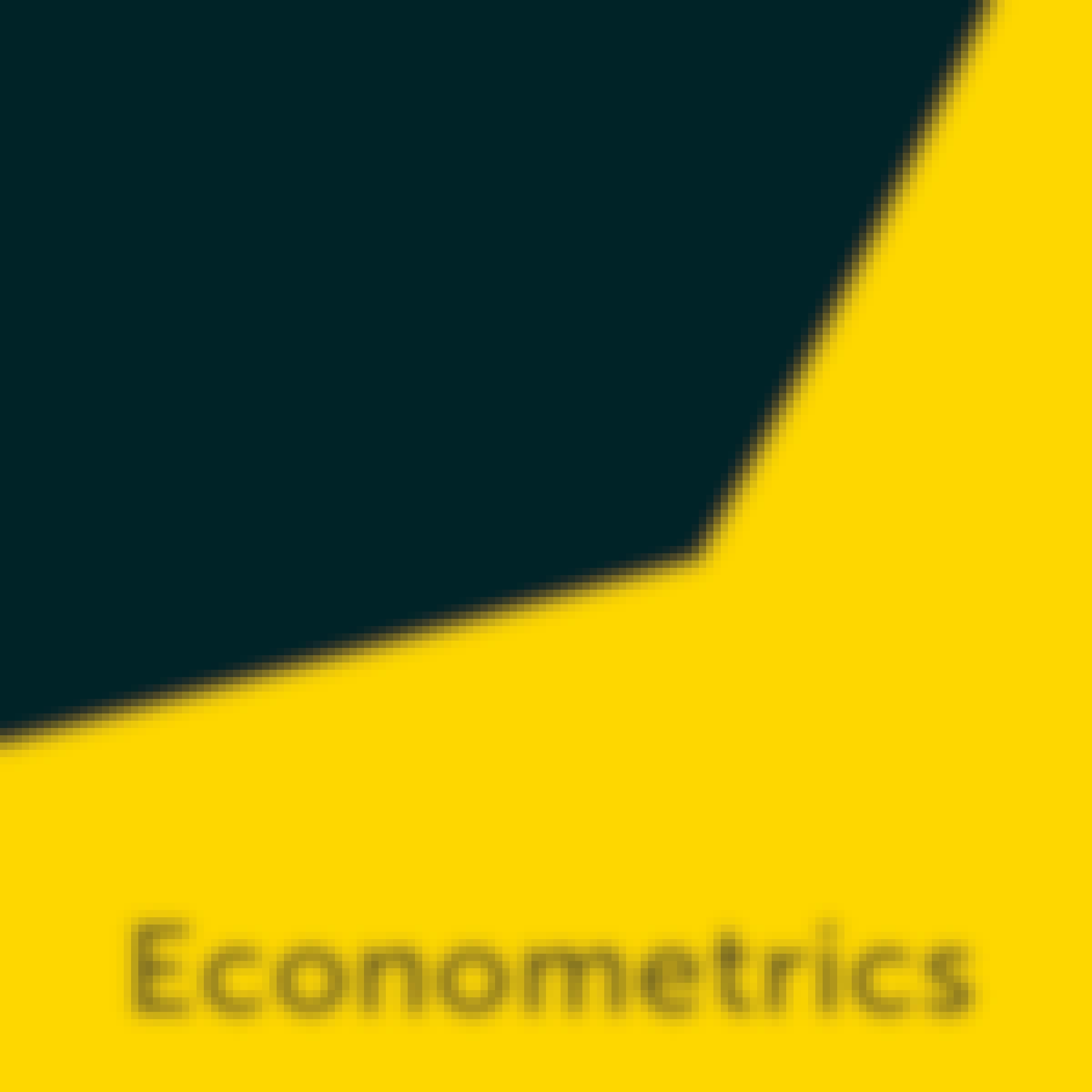 Status: PreviewPreviewE
Status: PreviewPreviewEErasmus University Rotterdam
Skills you'll gain: Econometrics, Time Series Analysis and Forecasting, Regression Analysis, Logistic Regression, Data Analysis, Analytics, Statistical Analysis, Statistics, Case Studies, Forecasting, Model Evaluation, Probability, Linear Algebra, Peer Review
4.6·Rating, 4.6 out of 5 stars1.2K reviewsMixed · Course · 1 - 3 Months
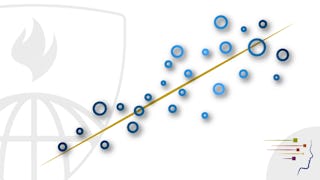 Status: Free TrialFree TrialJ
Status: Free TrialFree TrialJJohns Hopkins University
Skills you'll gain: Regression Analysis, Statistical Analysis, Statistical Modeling, Logistic Regression, Data Analysis, Model Evaluation, Probability & Statistics, Statistical Inference
4.4·Rating, 4.4 out of 5 stars3.4K reviewsMixed · Course · 1 - 4 Weeks
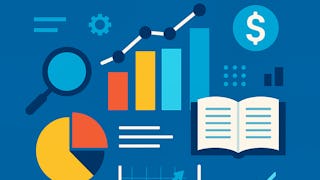 Status: NewNewStatus: PreviewPreviewO
Status: NewNewStatus: PreviewPreviewOO.P. Jindal Global University
Skills you'll gain: Econometrics, Regression Analysis, Probability & Statistics, Statistical Modeling, Statistical Analysis, Correlation Analysis, Time Series Analysis and Forecasting, Economics, Statistical Inference, Probability Distribution, Logistic Regression, Model Evaluation
Build toward a degree
Beginner · Course · 1 - 3 Months
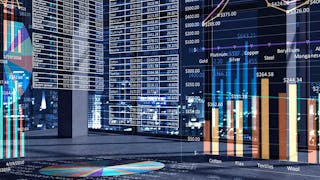 Status: PreviewPreviewS
Status: PreviewPreviewSStanford University
Skills you'll gain: Descriptive Statistics, Statistics, Statistical Methods, Sampling (Statistics), Statistical Analysis, Data Analysis, Statistical Modeling, Statistical Hypothesis Testing, Regression Analysis, Statistical Inference, Probability, Exploratory Data Analysis, Quantitative Research, Probability Distribution
4.6·Rating, 4.6 out of 5 stars4.3K reviewsBeginner · Course · 1 - 3 Months
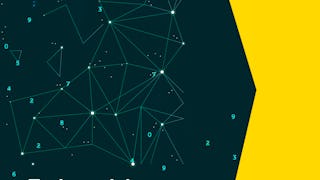 Status: FreeFreeE
Status: FreeFreeEErasmus University Rotterdam
Skills you'll gain: Econometrics, Data Collection, Probability & Statistics, Regression Analysis, Survey Creation, Statistics, Quantitative Research, Descriptive Statistics, Data Literacy, Time Series Analysis and Forecasting, Statistical Analysis, Model Evaluation
4.1·Rating, 4.1 out of 5 stars138 reviewsBeginner · Course · 1 - 3 Months
 Status: PreviewPreviewY
Status: PreviewPreviewYYale University
Skills you'll gain: Behavioral Economics, Storytelling, Economics, Economic Development, Financial Forecasting, Forecasting, Socioeconomics, Social Studies, Market Dynamics, Consumer Behaviour, Analysis, Labor Relations
4.8·Rating, 4.8 out of 5 stars894 reviewsBeginner · Course · 1 - 4 Weeks
What brings you to Coursera today?
 Status: Free TrialFree TrialJ
Status: Free TrialFree TrialJJohns Hopkins University
Skills you'll gain: Statistical Hypothesis Testing, Sampling (Statistics), Regression Analysis, Bayesian Statistics, Statistical Analysis, Probability & Statistics, Statistical Inference, Statistical Methods, Statistical Modeling, Linear Algebra, Probability, Probability Distribution, R Programming, Biostatistics, Data Science, Statistics, Mathematical Modeling, Data Analysis, Data Modeling, Applied Mathematics
4.4·Rating, 4.4 out of 5 stars787 reviewsAdvanced · Specialization · 3 - 6 Months
 Status: Free TrialFree Trial
Status: Free TrialFree TrialSkills you'll gain: Bayesian Statistics, Descriptive Statistics, Statistical Hypothesis Testing, Statistical Inference, Sampling (Statistics), Data Modeling, Statistics, Probability & Statistics, Statistical Analysis, Statistical Methods, Statistical Modeling, Marketing Analytics, Tableau Software, Data Analysis, Spreadsheet Software, Analytics, Time Series Analysis and Forecasting, Regression Analysis
4.8·Rating, 4.8 out of 5 stars385 reviewsBeginner · Course · 1 - 3 Months
 Status: Free TrialFree TrialR
Status: Free TrialFree TrialRRice University
Skills you'll gain: Statistical Hypothesis Testing, Microsoft Excel, Statistical Methods, Pivot Tables And Charts, Regression Analysis, Statistics, Descriptive Statistics, Probability & Statistics, Graphing, Spreadsheet Software, Probability Distribution, Business Analytics, Statistical Modeling, Statistical Analysis, Statistical Inference, Excel Formulas, Data Analysis, Data Presentation, Model Evaluation, Sample Size Determination
4.7·Rating, 4.7 out of 5 stars13K reviewsBeginner · Specialization · 3 - 6 Months
 Status: Free TrialFree Trial
Status: Free TrialFree TrialSkills you'll gain: Regression Analysis, Statistical Hypothesis Testing, Logistic Regression, Model Evaluation, Statistical Modeling, Predictive Modeling, Statistical Analysis, Analytics, Advanced Analytics, Data Analysis, Correlation Analysis, Data Modeling, Business Analytics, Machine Learning, Exploratory Data Analysis, Variance Analysis, Python Programming
4.7·Rating, 4.7 out of 5 stars586 reviewsAdvanced · Course · 1 - 3 Months
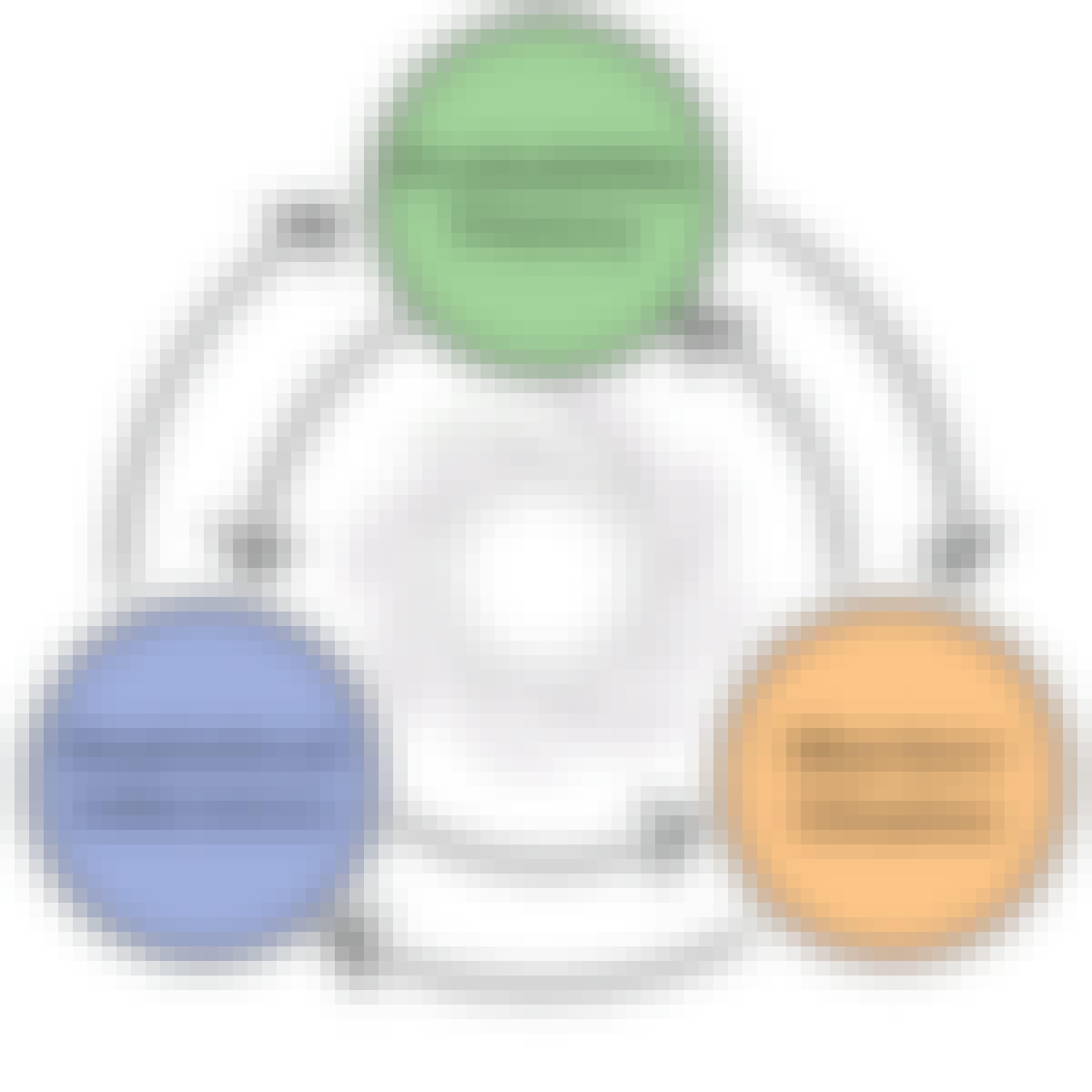 Status: NewNewStatus: Free TrialFree TrialU
Status: NewNewStatus: Free TrialFree TrialUUniversity of Colorado Boulder
Skills you'll gain: Probability, Statistical Inference, Estimation, Statistical Methods, Probability & Statistics, Statistics, Probability Distribution, Markov Model, Data Literacy, Statistical Analysis, Sampling (Statistics), Bayesian Statistics, Applied Mathematics, Artificial Intelligence, Generative AI, Data Science, Theoretical Computer Science, Data Analysis, Machine Learning Algorithms, Mathematical Theory & Analysis
Build toward a degree
4.4·Rating, 4.4 out of 5 stars336 reviewsIntermediate · Specialization · 3 - 6 Months
 Status: NewNewStatus: PreviewPreviewO
Status: NewNewStatus: PreviewPreviewOO.P. Jindal Global University
Skills you'll gain: Sampling (Statistics), Statistical Analysis, Probability Distribution, Statistical Hypothesis Testing, Descriptive Statistics, Statistical Methods, Correlation Analysis, Regression Analysis, R (Software), R Programming, Statistical Modeling, Statistical Inference, Probability, Big Data, Decision Tree Learning
Build toward a degree
Mixed · Course · 1 - 3 Months
Searches related to econometrics
In summary, here are 10 of our most popular econometrics courses
- Econometrics: Methods and Applications: Erasmus University Rotterdam
- Regression Models: Johns Hopkins University
- Econometrics - Theory and Practice: O.P. Jindal Global University
- Introduction to Statistics: Stanford University
- Enjoyable Econometrics: Erasmus University Rotterdam
- Narrative Economics: Yale University
- Advanced Statistics for Data Science: Johns Hopkins University
- Statistics Foundations: Meta
- Business Statistics and Analysis: Rice University
- Regression Analysis: Simplify Complex Data Relationships: Google
Skills you can learn in Probability And Statistics
Frequently Asked Questions about Econometrics
Econometrics is the application of statistical and mathematical theories to economics for the purpose of testing hypotheses and forecasting future trends. It plays a crucial role in understanding economic relationships and making informed decisions based on data. By combining economic theory with statistical methods, econometrics helps economists and policymakers analyze complex data sets, leading to better insights into economic phenomena. This field is important because it provides the tools necessary to evaluate economic policies, assess market conditions, and understand consumer behavior, ultimately contributing to more effective economic strategies.
A background in econometrics can open doors to various career opportunities. Common job roles include data analyst, economic consultant, financial analyst, and policy advisor. These positions often require strong analytical skills and the ability to interpret complex data. Additionally, roles in academia or research institutions may focus on teaching or conducting studies related to economic theories and their applications. As businesses increasingly rely on data-driven decision-making, professionals with econometric skills are in high demand across sectors such as finance, government, and academia.
To succeed in econometrics, you should develop a solid foundation in statistics, mathematics, and economic theory. Key skills include proficiency in statistical software (like R or Stata), data analysis, and the ability to interpret results. Understanding regression analysis, hypothesis testing, and time series analysis is also essential. Additionally, strong problem-solving skills and critical thinking will help you apply econometric methods effectively. Familiarity with programming languages can enhance your ability to manipulate and analyze data sets, making you a more competitive candidate in the job market.
There are several online courses available that can help you learn econometrics effectively. Some recommended options include Econometrics - Theory and Practice, which provides a comprehensive overview of econometric methods, and Enjoyable Econometrics, designed to make learning engaging and accessible. Another great choice is Econometrics: Methods and Applications, which focuses on practical applications of econometric techniques. These courses cater to various learning styles and can help you build a strong foundation in econometrics.
Yes. You can start learning econometrics on Coursera for free in two ways:
- Preview the first module of many econometrics courses at no cost. This includes video lessons, readings, graded assignments, and Coursera Coach (where available).
- Start a 7-day free trial for Specializations or Coursera Plus. This gives you full access to all course content across eligible programs within the timeframe of your trial.
If you want to keep learning, earn a certificate in econometrics, or unlock full course access after the preview or trial, you can upgrade or apply for financial aid.
To learn econometrics effectively, start by familiarizing yourself with basic statistical concepts and economic theories. Enroll in online courses that suit your learning style and schedule. Practice is crucial, so work on real-world data sets to apply the concepts you learn. Engage with online forums or study groups to discuss challenges and share insights with peers. Additionally, consider reading textbooks or research papers to deepen your understanding of advanced topics. Consistent practice and application of econometric methods will reinforce your learning and build your confidence.
Econometrics courses typically cover a range of topics, including regression analysis, hypothesis testing, time series analysis, and panel data analysis. You may also explore advanced topics such as causal inference, instrumental variables, and limited dependent variable models. Many courses incorporate practical applications, allowing you to work with real data sets and learn how to interpret results effectively. Understanding these topics will equip you with the skills needed to analyze economic data and make informed decisions based on your findings.
For training and upskilling employees in econometrics, courses like Econometrics - Theory and Practice and Econometrics: Methods and Applications are excellent choices. These courses provide a solid foundation in econometric methods and their practical applications, making them suitable for professionals looking to enhance their analytical skills. By investing in such training, organizations can empower their workforce to make data-driven decisions, ultimately improving overall performance and competitiveness.










